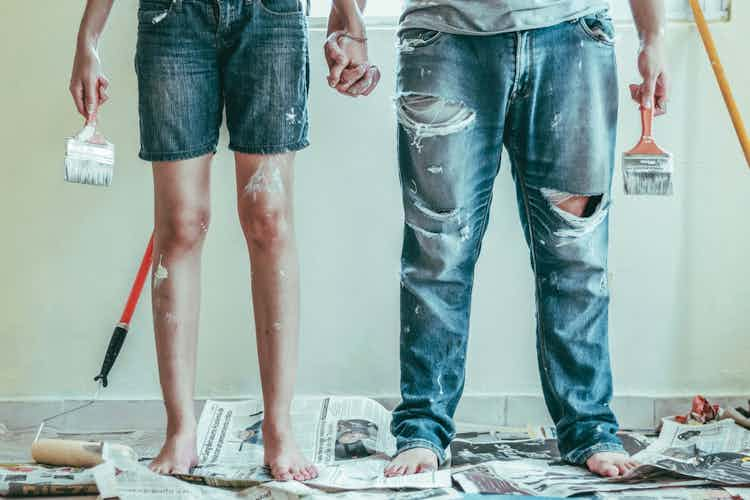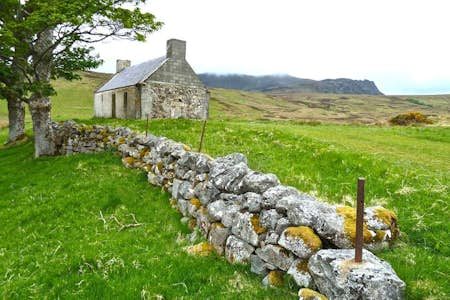The moment you finally close the deal on that dream home is a time that you will never forget. However, saving for the deposit, negotiating the best mortgage and finding that dream property takes time and effort. Consequently, it is essential to note the subtle and unsubtle ways in which you can devalue your home.
What devalues a house?
Before we look at 15 ways you can devalue your home, it is essential to realise how your actions may impact the value of your property. In simple terms, making your home attractive to the mass market is positive; making your home attractive to a niche market is negative. So let us look at this concept in more detail.
1. Reducing the number of bedrooms
Many people choose to convert the smallest bedroom, sometimes referred to as the “box room”, into a bathroom, playroom, etc. While this may suit your particular situation at the time, it can have a significant impact on the long-term value of your home. If your house is relatively large, then a reduction in the number of bedrooms will likely remove families from your list of potential buyers.
It's a good idea to check with an estate agent to see whether any planned renovations would have a material impact on the value of your home. Sceptics might suggest that you convert the room back into a bedroom in the future. Unfortunately, those in this particular camp will find it is not as easy as it sounds.
2. Individualist decor
Perhaps the easiest way to demonstrate how individualist decor can impact the value of your home is to take a look at highly paid footballers and their "unique style". A perfect example of this would be former Manchester City and Aston Villa player Stephen Ireland. While he eventually sold his home for just under £4 million, it contained a built-in 6000 L aquarium with 500 exotic fish. It is safe to say that this type of “decor” does not appeal to the masses!
While this may be an extreme example, it perfectly illustrates how placing your stamp on a property can impact the long-term value.
3. Planning application mishaps
You must obtain the appropriate planning permission for renovations to your property; otherwise, it could prove costly. In some cases, local authorities may grant retrospective planning permission. However, it is also common for local authorities to refuse applications. If you fail to apply for planning permission, your local authority can insist you return the property to its former setup. Consequently, it is crucial to have all of the planning permission documentation when selling your home.
If a buyer found that the council didn't formally approve renovations, they might insist on a price reduction. Therefore, you must cover your back when looking to make renovations and ensure you have the appropriate paperwork and approval in place.
4. Unkempt garden
If you have a home with a garden, the garden will be the first thing that visitors see. Unfortunately, you don't get a second chance to make a first impression. So, if your garden looks unkempt, you may well see potential buyers turn away before they have even entered your home. Those who sign up for a relatively ambitious garden setup when buying their dream home are the ones who tend to suffer. They lose interest, the garden quickly becomes unkempt, and it does not give a good impression for those looking on.
There are ways and means to simplify the garden around your home, minimise maintenance and maximise the simplistic look. A tidy garden will go unnoticed, but an untidy garden will be the first thing that potential buyers see.
5. An unwelcoming front door
There are many issues to consider concerning curb appeal, one of which is the look of your front door. We know that we can replace a front door for a relatively modest cost, but it can set alarm bells ringing. If you cannot maintain your front door to an acceptable standard, what horrors may lie behind the door?
If you are ever looking to sell your home, remember that potential buyers don't know you or how tidy/untidy you might be. Would your current front door welcome a stranger? Would it give an excellent first impression?
6. Removing the bath
One of the best ways to maximise the value of your home, if you’re looking to sell, is to ensure that it appeals to as broad an audience as possible. For example, something as simple as removing a bath in favour of a shower may seem sensible at the time and save space. However, how might this impact the broader appeal of your property if you eventually decided to sell?
Put yourself in the shoes of a young couple who may have or are planning to have children. Bath time with children can be challenging at the best of times; a shower only bathroom would not help. Therefore, you have reduced the number of potential buyers and thus competition for your home.
7. Unwanted odours
Whether you have young children, pets, or perhaps you smoke, these may create unwanted odours in your home. For many of us, the fact that we live in the property means that we are often unaware of these suspicious smells. A fresh aired home certainly gives a very different impression to one retaining the family pet's odour.
Unfortunately, some potential buyers will use issues such as suspicious odours to try and talk down the asking price. Other unwelcome smells may include dampness and mould, which are more concerning and relatively expensive to fix.
8. Chaos and clutter
When potential buyers walk into a property, many will want to try and imagine how it would look with their furniture and decor style. Unfortunately, if you have a relatively big family or busy life, your house can quickly become chaotic and cluttered. This does not give a great first impression to any potential buyers and may impact any offers you receive.
Neutral paint colours, a fresh feel and, more importantly, space may well catch the eye of a potential buyer. As we touched on above, try to put yourself in the shoes of a potential buyer and imagine how you would react to a house of chaos and clutter.
9. Botched DIY
Some can and others can't when it comes to DIY! So stick to the simple rule; if DIY is not your forte, find somebody that can do it for you. Unfortunately, many "DIY enthusiasts" find that repairing their DIY nightmare can be a lot more expensive than paying someone to do it in the first place. However, you may have friends and family with DIY skills; maybe they can help?
Popular DIY television programmes give the impression that carrying out renovations is easy. But don't forget that snippet of TV coverage may have been shot numerous times before it was perfected. As a result, we have no idea what goes on behind the scenes. Is it always so perfect? No.
10. Open plan layout
Open plan layouts are a fascinating subject because, for many people, they are preferable, while for others, they can be a negative. It is safe to say that most homeowners will prefer rooms that give an enhanced feeling of privacy. They can also encourage different colours, decor and furniture for different rooms. However, if everything is open plan, it may be challenging to incorporate different styles throughout your house.
If you look at this from a practical point of view, a large open plan layout can also lead to enhanced heating bills. This is because you are not heating room by room; you are heating one colossal room, which can prove relatively expensive.
11. Loose roof tiles
In reality, very few homes will have a perfect roof, but those with highly visual imperfections can devalue your home. For example, let's assume there are several roof tiles loose or missing. Firstly, this does not maximise the visual impact of your property. Secondly, if there are loose roof tiles, there is every chance there will be a degree of damage to the supporting joists and loft. It can be expensive to have an expert look at your roof, even if no significant additional work is required.
Loose or missing roof tiles can cause massive damage to your home. If rain is allowed to penetrate, it can also erode walls and cause mould and other issues. Therefore, it is essential to inspect your roof regularly and call in experts if you can see any damage.
12. Converting a garage
Converting a garage can be an exciting project. However, whether it will devalue or increase the value of your home is debatable. Before we consider different types of conversions, a garage does have value in its own right. The ability to park your vehicle(s) in a safe and secure environment is beneficial and will reduce your insurance premiums. The alternative is to park your car on the driveway or on the road – which are less safe.
There is an argument that converting your garage into another bedroom will increase the value of your property. In contrast, using the garage space to extend your home, perhaps giving you a larger kitchen or a games room, may not be as valuable. As the cost of nursing homes continues to rise, there is a feeling that more people will choose to look after their parents at home. For many, converting their garage into an additional bedroom helps parents retain an element of independence while help is at hand.
There are two trains of thought when converting a garage, although, for many people, family comes before everything else.
13. Reduced curb appeal
If you’re looking to sell your property in the future, curb appeal is something that you will need to consider. As we touched on above, curb appeal takes in several different issues such as gardens, roofs and something as simple as your front door. In addition, there are other issues to consider, such as exterior paintwork, style/condition of window frames, garden furniture and the state of your driveway.
Individually and collectively, it is neither difficult nor expensive to improve the above issues and enhance your curb appeal. We have mentioned this before; you only get one chance to make a first impression. Unfortunately, if your home has no curb appeal, no matter how nice it is inside, many potential buyers will turn around and head to the next property.
14. Introducing a hot tub
Hot tubs are a trendy product at the moment and will no doubt prompt some extreme differences in opinion. However, before you prejudge, let's look at the issues to consider.
The price of hot tubs has fallen dramatically in recent years, with many budget stores joining the party. However, if looking to purchase a property with an average size hot tub, it is estimated that the cost will be anywhere between 75p and £1 a day. In addition, some larger hot tubs may incur daily charges of up to £1.50, which in isolation may not seem much. However, then we have general wear and tear and the cost of repairs, which can often be significant.
Putting costs aside, it’s essential to look at the safety aspects, too. For example, potential homebuyers with children would likely feel uncomfortable if there was already a pre-fitted hot tub. While there are obvious actions you can take to address safety, children are naturally curious. For many parents, the risk is too high.
Be careful; you could be devaluing your property!
It is essential to be aware of the potential impact your actions could have on the value of your home. We have highlighted some scenarios which could lead to a reduced property valuation. If we flip this, the key to maximising the value of your home is to make it as attractive as possible to as many potential buyers as possible. This encourages competition, higher offers and can make your home stand out from others in the neighbourhood.








